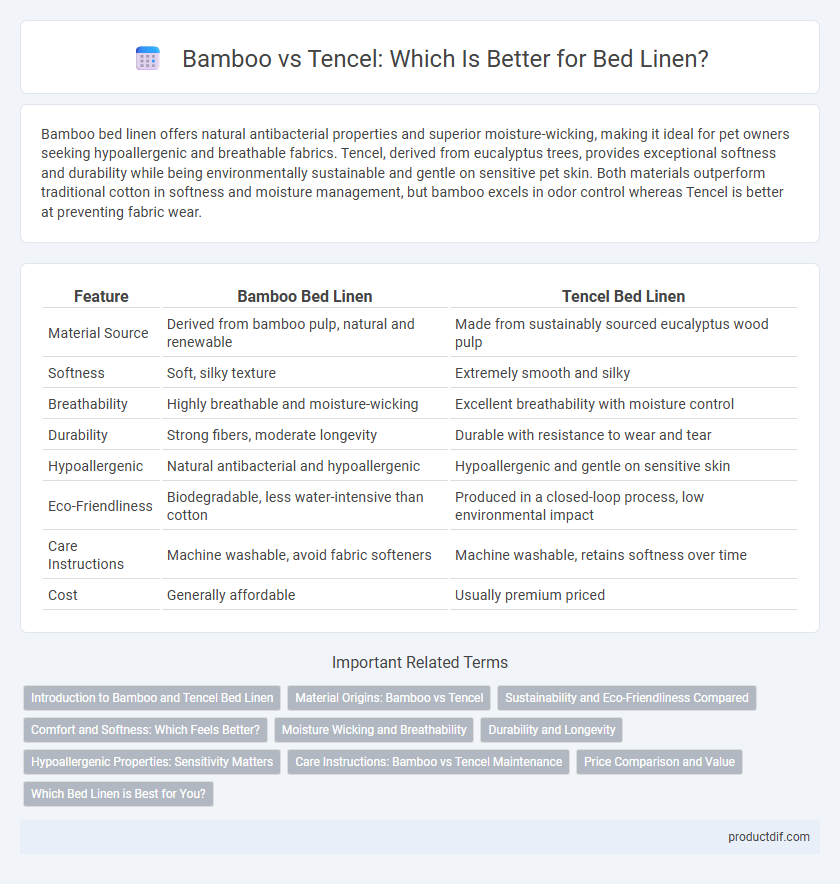Bamboo bed linen offers natural antibacterial properties and superior moisture-wicking, making it ideal for pet owners seeking hypoallergenic and breathable fabrics. Tencel, derived from eucalyptus trees, provides exceptional softness and durability while being environmentally sustainable and gentle on sensitive pet skin. Both materials outperform traditional cotton in softness and moisture management, but bamboo excels in odor control whereas Tencel is better at preventing fabric wear.
Table of Comparison
| Feature | Bamboo Bed Linen | Tencel Bed Linen |
|---|---|---|
| Material Source | Derived from bamboo pulp, natural and renewable | Made from sustainably sourced eucalyptus wood pulp |
| Softness | Soft, silky texture | Extremely smooth and silky |
| Breathability | Highly breathable and moisture-wicking | Excellent breathability with moisture control |
| Durability | Strong fibers, moderate longevity | Durable with resistance to wear and tear |
| Hypoallergenic | Natural antibacterial and hypoallergenic | Hypoallergenic and gentle on sensitive skin |
| Eco-Friendliness | Biodegradable, less water-intensive than cotton | Produced in a closed-loop process, low environmental impact |
| Care Instructions | Machine washable, avoid fabric softeners | Machine washable, retains softness over time |
| Cost | Generally affordable | Usually premium priced |
Introduction to Bamboo and Tencel Bed Linen
Bamboo bed linen is crafted from bamboo fibers, renowned for their natural antibacterial properties, breathability, and moisture-wicking abilities, making them ideal for sensitive skin and hot sleepers. Tencel bed linen, made from sustainably sourced eucalyptus wood pulp, offers exceptional softness, durability, and eco-friendly credentials due to its closed-loop production process. Both materials provide hypoallergenic benefits and superior comfort, with bamboo excelling in thermal regulation and Tencel standing out for its silky texture and environmental sustainability.
Material Origins: Bamboo vs Tencel
Bamboo bed linen is derived from the fibrous pulp of bamboo plants, known for their rapid growth and eco-friendly cultivation. Tencel, a brand name for lyocell fibers, originates from sustainably sourced eucalyptus wood processed through a closed-loop system, minimizing environmental impact. Both materials offer natural alternatives to traditional cotton, emphasizing renewable resources and sustainable manufacturing practices.
Sustainability and Eco-Friendliness Compared
Bamboo bed linen offers natural antibacterial properties and requires less water to grow than cotton, making it a sustainable textile choice, but chemical-intensive processing can affect its eco-friendliness. Tencel, derived from sustainably managed eucalyptus forests, utilizes closed-loop production that recycles water and solvents, significantly reducing environmental impact. Both materials provide biodegradable, renewable options, yet Tencel's certified eco-friendly manufacturing often results in a lower carbon footprint compared to bamboo.
Comfort and Softness: Which Feels Better?
Bamboo bed linen offers exceptional softness with a silky texture that enhances overall comfort and moisture-wicking properties, making it ideal for sensitive skin. Tencel, derived from eucalyptus fibers, provides a smooth, cool feel with excellent breathability and durability, reducing irritation during sleep. Both materials excel in softness, but bamboo tends to feel silkier, while Tencel offers a more lightweight and breathable comfort.
Moisture Wicking and Breathability
Bamboo bed linen offers excellent moisture-wicking properties due to its natural fibers that absorb and evaporate sweat quickly, keeping sleepers dry throughout the night. Tencel, derived from eucalyptus wood pulp, boasts superior breathability and moisture management by actively drawing moisture away from the skin and allowing for rapid evaporation. Both materials provide enhanced temperature regulation, making them ideal choices for hot sleepers seeking breathable, moisture-wicking bedding options.
Durability and Longevity
Bamboo bed linen offers strong fibers that resist wear and tear, providing excellent durability and long-lasting use. Tencel sheets feature enhanced strength due to their lyocell fibers, which maintain fabric integrity and softness even after multiple washes. Both materials outperform traditional cotton in longevity, with Tencel often showing superior resistance to pilling and shrinkage over time.
Hypoallergenic Properties: Sensitivity Matters
Bamboo bed linen is naturally hypoallergenic, resisting dust mites and bacteria, making it ideal for sensitive skin and allergy sufferers. Tencel fabrics also offer remarkable hypoallergenic features due to their smooth fibers that minimize irritation and promote breathability. Both materials support a healthier sleeping environment by reducing allergens and enhancing comfort for sensitive individuals.
Care Instructions: Bamboo vs Tencel Maintenance
Bamboo bed linen requires gentle washing in cold water with mild detergent to maintain its softness and durability, avoiding bleach and high heat drying to prevent fiber damage. Tencel sheets benefit from similar care, including machine washing in cool water and tumble drying on low heat, while ironing on low settings helps preserve their smooth texture. Both fabrics require delicate handling to extend lifespan, but Tencel is generally more resistant to wrinkles and shrinkage compared to bamboo.
Price Comparison and Value
Bamboo bed linen typically costs less than Tencel, making it an affordable option for consumers seeking softness and eco-friendliness. Tencel, derived from sustainably sourced eucalyptus trees, commands a higher price due to its superior moisture-wicking properties and durability. The value of Tencel lies in its breathability and long-lasting quality, whereas bamboo offers excellent comfort at a more budget-friendly price point.
Which Bed Linen is Best for You?
Bamboo bed linen offers exceptional softness, natural antibacterial properties, and excellent moisture-wicking, making it ideal for hot sleepers and sensitive skin. Tencel bed linen, derived from sustainably harvested eucalyptus, excels in breathability and durability while maintaining a smooth, silky feel perfect for those seeking eco-friendly luxury. Choosing the best bed linen depends on your priorities: bamboo for moisture control and antibacterial benefits or Tencel for sustainability and long-lasting softness.
Bamboo vs Tencel Infographic

 productdif.com
productdif.com